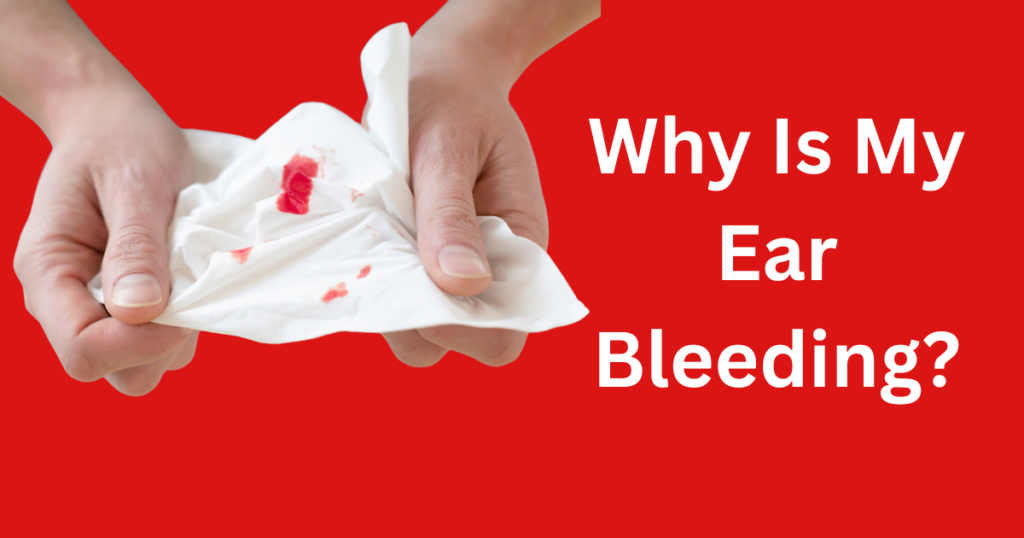Finding blood in your ear can be alarming. Whether it’s a small amount or more noticeable, it’s natural to wonder, “Why is my ear bleeding?” Bleeding from the ear can range from mild to severe, so it’s important to determine the root causes and suitable measures for each case. In this article, we’ll dive into the most common reasons for ear bleeding, what it means, and when you should seek professional help.
Common Reasons for Ear Bleeding
Bleeding from the ear can have several causes, and not all of them are related to injury. Some common reasons for ear bleeding include:
1. Injury or Trauma
One of the most frequent causes of bleeding is trauma. This can happen if you insert something sharp into the ear canal, such as a cotton swab or bobby pin. Even vigorous cleaning can sometimes scratch the delicate skin inside your ear. Trauma may lead to dried blood in the ear, which can look alarming, especially in toddlers.
2. Ear Infections
Ear infections are another possible cause. When an ear infection becomes severe, it may cause ear bleeding with little or no pain. This condition is especially common in children. Infections can also lead to the formation of dark earwax, which sometimes contains traces of blood.
3. Ruptured Eardrum
A ruptured eardrum is a more serious cause of bleeding. This can happen due to an ear infection, sudden changes in air pressure, or even loud sounds. If the eardrum bursts, you may experience painless bleeding and possibly some hearing loss.
4. Foreign Objects in the Ear
Children, in particular, may place small objects into their ears, which can cause injury and bleeding. If you notice blood in your child’s ear or dark earwax that seems unusual, it could be due to an object causing irritation.
5. Chronic Ear Conditions
For those with ongoing ear problems, such as chronic otitis media, bleeding may occasionally occur. In such cases, you might notice dark brown ear wax or other changes in the color of earwax, indicating an underlying issue.
Ear Wax Colors and Their Meaning
The color of your earwax can sometimes provide clues about your ear health. For instance:
- Orange Ear Wax: Normal and healthy.
- Dark Brown Ear Wax: May indicate old earwax or an ear infection.
- Dark Ear Wax with Blood: Could be a sign of bleeding or injury inside the ear.
What to Do If You See Blood in Your Ear
If you find yourself asking, “Why is my ear bleeding?” here’s what you can do:
1. Assess the Situation
First, determine if there is any pain associated with the bleeding. If the bleeding is painless and stops quickly, it could be from minor irritation. However, if it persists or there are other symptoms, like dizziness or hearing loss, it’s best to consult a doctor.
2. Avoid Further Insertion into the Ear
It’s crucial not to put anything into your ear while it’s bleeding. Resist the urge to clean the ear with cotton swabs or other objects, as this could make things worse.
3. Seek Medical Help
If the bleeding doesn’t stop, or if you experience ear pain, a sense of fullness, or hearing loss, visit a healthcare provider. They can help diagnose the underlying cause, whether it’s an ear infection, a ruptured eardrum, or something else.
When to See a Doctor
While some ear bleeding cases are minor, others require medical attention. Here are some situations where you should consult a doctor immediately:
- Persistent Ear Bleeding: If blood continues to flow for more than a day or two.
- Ear Bleeding with No Pain but Hearing Loss: This could indicate a ruptured eardrum or infection.
- Dark Earwax with Blood: If the blood in your ear wax is accompanied by unusual colors like dark brown or black, it could signal an ear infection or foreign object.
- Accompanied by Other Symptoms: If dizziness, fever, or intense ear pain accompanies the bleeding, don’t delay seeking professional advice.
Ear bleeding can have several causes, from minor injuries to more serious conditions like a ruptured eardrum. While it can be painless at times, such as in the case of an infection, it’s always important to pay attention to your symptoms and seek medical advice if needed. If you find yourself asking, “Why is my ear bleeding?” keep in mind that while it is frequently not serious, it’s important to investigate further, especially if the bleeding continues or is paired with other symptoms.
If you’re dealing with recurring ear issues or notice any changes in your earwax color, don’t hesitate to book an appointment with a healthcare provider. Taking care of your ears is essential to maintaining good overall health.
You May Also Like:
In our ongoing effort to provide comprehensive information about ear health, you might find the following articles particularly useful:
- Can Impacted Earwax Cause Jaw Pain?
If you’ve been experiencing jaw pain and suspect it might be related to earwax, this article explores the connection and provides insights into managing the issue. You can also read: - Will Ear Wax Cause Dizziness?
Dizziness can be unsettling and sometimes linked to earwax buildup. You can also read: Will ear wax cause dizziness - What is Earwax Made of?
Curious about the composition of earwax? This article delves into what earwax is made of and its role in ear health. You can also read: What is Earwax Made of?



